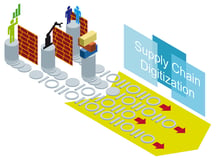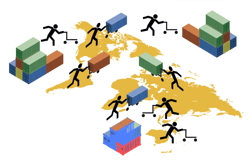Cloud Computing in Global Supply Chain Management
Nick Ostdick - April 07, 2016

In a recent entry about the hurdles supply chain planners and mangers may face in 2016, we discussed the implementation of new technologies and how companies that embrace these advancements in supply chain logistics automation will see greater levels of connectivity and collaboration across all points of the supply network. Key technology drivers industry-wide such as The Internet of Things, Industry 4.0, Big Data, and In-Memory Data are forcing companies to rethink end-to-end supply practices to achieve greater responsiveness and agility.
![]()
 Cloud computing, though sadly still something of a novelty to many within the supply landscape, not only encourages increased connectivity through the accessibly of information and data, but it can also be an important tool in leveraging a more efficient global supply chain management strategy, especially when it comes to supply logistics in booming industries such as the automotive sector, which is currently seeing massive expansion into new and emerging markets due to the low costs of fuel and transportation.
Cloud computing, though sadly still something of a novelty to many within the supply landscape, not only encourages increased connectivity through the accessibly of information and data, but it can also be an important tool in leveraging a more efficient global supply chain management strategy, especially when it comes to supply logistics in booming industries such as the automotive sector, which is currently seeing massive expansion into new and emerging markets due to the low costs of fuel and transportation.
While there are certainly challenges in transitioning from a more transactional data storage or computing system to a cloud-based service, the potential benefits companies stand to experience far outweigh any temporary complications.
The Value of Cloud Computing
Before we examine the specific ways in which cloud computing acts as a value-added proposition increasing overall ROI, it’s important to pull back and put cloud computing in a context for those who remain doubtful of its utility and importance in today’s rapid-evolving, global supply chain landscape.
For comparison sake, let’s use the advent and proliferation of email as a lens to dissect cloud computing. Email, in its early days, was in some sense regarded as a confusing, ill-suited method of communication that would breed confusion and complication in the relaying of complex messages. However, over time companies began to realize its value in helping to alleviate a number of pain points.
In relation to snail mail or parcel post, emails were faster, more reliable, and cost-efficient. In addition, they created a paper-trail of accountability and increased the ability for collaboration and communication throughout a company or organization by bringing more and more employees into the fold to simultaneously voice their opinions.
 Now, let’s look at cloud computing through this same scope.
Now, let’s look at cloud computing through this same scope.
Cloud-based applications are faster and more powerful than external IT data management systems, allowing for more complex data processing and sharing. Cloud technology, because of its ease and accessibility of access points, allows for more minds to retrieve and analyze inventory or transportation data to help make of-the-moment decisions based on real-time reporting. Suppliers and freight managements can also utilize these real-time reporting capabilities to track and locate products at any point in the manufacturing, distribution, or shipping cycles, which help engender a 360-degree view of the overall supply stream.
Much like email in its early days, cloud computing should be seen as less of a shortcut and more of a powerful tool to enhance a company’s supply stream.
4 Benefits of Cloud Computing
With the broad-strokes value of cloud computing fully established, we can now examine several concrete ways in which leveraging this technology not only streamlines existing supply chain solutions, but also creates new and innovative avenues for companies to conceive and execute global supply operations.
1). Scalability: Because cloud-based computing solutions exist in the digital world, it’s easy for companies to scale up or scale down their cloud computing capacity without undergoing massive, costly software overhauls. Cloud technology is based on usage models - unlike more traditional data storage and transfer systems - and as such supply chain planners and managers can adjust the scope of their cloud-based computing capacity based on the projects and markets they’re trying to fulfill.
2). Cost-efficiency: If the costs of establishing and implementing a cloud computing solution are based primarily on usage, then updates, upgrades, enhancements, and scaling make cloud-based computing a cost-effective method of data storage and reporting, increasing ROI and promoting sustainable growth across all points of the supply pipeline. In an era of rapid expansion on a worldwide level, the capacity to maintain one central point of data and reporting that can be accessed across the globe is a key driver in keeping information and technology costs to a minimum. A recent article in Forbes cited a study by SCM World that indicated new companies are only able to allocate about 11 percent of their budget for IT systems, which makes cost-effective solutions like cloud computing a must.
3). Onboarding: Global growth and expansion means companies will be taking on more partners or third-party organizations to assist with the complexities of global supply chain management. Onboarding, or the merging of data and analytics between newly acquired or partner groups, can often be a laborious, time-consuming process with a great deal of waste when it comes to resources. Cloud computing helps reduce the amount of lag time when merging large pools of data and reporting and makes the integration of partner companies run as smoothly as possible.
4). Flexibility: It’s no secret the name of the game in global supply chain management is flexibility and a supplier's capacity to adjust and respond to a variety of factors outside of a supply chain planner’s control. Whether we’re discussing adverse weather conditions, port strikes, labor disputes, product recalls, or spikes in demand, cloud computing provides suppliers with the process flexibility necessary to adequately address these issues. Through detailed, real-time reporting, a supplier can view and evaluate inventory levels, warehouse conditions, and previous freight routes and costs to identify fiscally-responsible solutions to supply disruptions. The ability to share data across all points of the supply stream also allows for suppliers to review these decisions and create best practice solutions going forward.
Cloud Computing Should Be A No-brainer
Talk to any supply chain planner or manager and they’ll tell you cloud computing probably won’t go by the wayside anytime soon - in fact, they’ll probably tell you the global supply chain industry is experiencing just the very beginning when it comes to cloud-based technology. But what you might hear is how there are still some companies slow to embrace and utilize cloud computing, and how these companies are taking a real gamble on their long-term survival by not incorporating this technology into their supply chain logistics.
For manufacturers, suppliers, shippers, and even retailers, cloud computing should be a priority when it comes to leveraging smart, intelligent software solutions to remain competitive in 2016 and beyond.
LATEST POSTS
- Understand Circular Economy in The Manufacturing Industry
- How Can Industry 4.0 IT Integration Be Achieved Smoothly?
- The Significance of Order Sequencing in Discrete Manufacturing
- How to improve your Supply Chain Management: The Power of Control Towers
- Optimizing Human Resource Scheduling in Manufacturing: A Technological Approach



